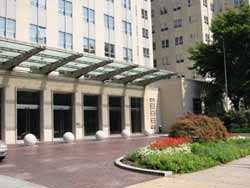Related Topics
Investing, Philadelphia Style
Land ownership once was the only practical form of savings, until banking matured in the mid-19th century. Philadelphia took an early lead in what is now called investment and still defines a certain style of it.
Opposition to Privatized Social Security

|
| The Brookings Institution |
The counter-attack on personal accounts was instantaneous, vociferous, and distorted. It alleged what was clearly not true ("taking our social security away from us"), and failed to bother about more plausible threats (entitlements like Medicare seem likelier targets of fiscal stringency). There is no history of similar agitation about IRAs. or other tax-sheltered savings incentives of the same model and no claims have been made that such programs have caused problems. This uproar seems to emanate principally from AFL/CIO headquarters in Washington, where Mr. Sweeney seems to be the leader. Labor Unions are spending considerable money and effort to stifle this proposal before it can develop momentum. The Brookings Institution contains people like Henry Aron and Reischauer, who surely understand the true issues involved, but have apparently retreated into silence. What is there about this relatively tame proposal, not particularly useful nor particularly harmful, which threatens the interests of organized Labor?

|
| Teamsters |
With no plausible incentives in sight, we resort to speculation about motives. Either Labor suspects President Bush of devious plans, or has devious plans of its own. The most obvious motive a Republican President might have, and one which is more or less acknowledged, is to "starve the beast", or force reductions in government spending by tax-cutting deficits. However, privatized retirement accounts would not seem to be a very plausible move in that direction.
More likely, Labor has its own interests in the benefits and retirement area that seem threatened by privatized accounts. The notorious retirement fund of the Teamsters is only one example of the long-standing involvement of unions in member benefits. Aside from funds directly controlled by unions, their involvement in Blue Cross boards and negotiations, and their influence on state employee retirement funds has been highly treasured. Workers Compensation is another example of heavy union influence in non-paycheck member compensation. Indeed, it is roughly the case that unions control the employees, while the stockholders control the management. There is imperfect agency in both cases, but until recently it has not been conceivable that unions would dominate corporate directors. But with progressive dispersal of stockholder shareholding and recombination of those voting rights into mutual and pension funds, even the House of Morgan can be seen to appeal to pension fund managers for control of the company. We've turned over a flat stone in corporate governance, and what is crawling out is the source of some concern.
To some extent, the same issue is raised in the Human Resources departments of corporations, constantly exercising delegated control over employees, and constantly in contact with insurance and pension executives of various ranks. Management controls or thinks it controls, two-thirds of employee income, but HR controls the remaining third, spending most of it on insurance plans of one sort or another. At the board level, mutual funds generally lean toward management whenever pension funds raise stockholder rights issues. But index funds and government savings plans could easily induce some subtle changes in sympathies.
It's speculative, of course. But is it possible this is the real battleground, with partial privatization of social security only an opening skirmish?
Originally published: Wednesday, June 21, 2006; most-recently modified: Wednesday, May 29, 2019